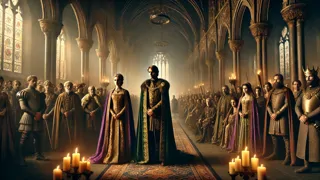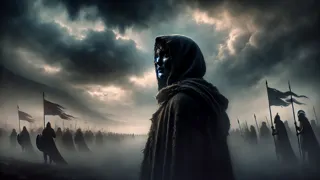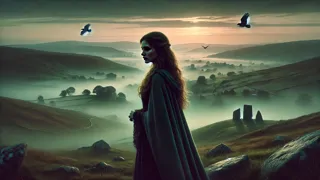Introduction
Mist drifts low over the rolling green hills of ancient Wales, where legend blends with the cold breath of the Irish Sea. In the dappled forests and along the rugged coastlines, the old stories are never truly silent. They echo in the wind, in the hush of rivers, and the sorrowful caw of ravens circling above ruined fortresses. It is here, between the veil of myth and memory, that the tale of Branwen, daughter of Llyr, unfolds. Her story is a tapestry of hope and ruin, woven with love’s fragile promise and the heavy threads of betrayal. In a time when kinship could unite kingdoms or doom them to ruin, Branwen’s beauty and gentleness made her a symbol of peace between warring lands. Yet fate, unyielding as the tide, would drag her into a storm from which none would emerge unchanged. Set against the backdrop of wild Welsh landscapes and shadowed Irish courts, this myth pulses with longing, loyalty, and the tragic price of pride. Through forested valleys, across storm-tossed seas, and into the torchlit halls of kings, Branwen’s journey is one of endurance and sorrow—a story as haunting and human today as it was centuries ago, echoing with the eternal questions of forgiveness and the weight of loss.
A Royal Union and a Fragile Peace
In the heart of Gwynedd, where the River Conwy carved its silver path through wild countryside, the great court of Bendigeidfran, called Bran the Blessed, presided over a kingdom whose strength was matched only by its traditions. Bendigeidfran was a giant among men, both in stature and in nobility of heart. His sister Branwen, daughter of Llyr, was beloved for her grace and wisdom, her laughter like the music of the river and her kindness spoken of in every hearth across the land. Their brother Manawydan, steadfast and keen, completed this trio whose lineage was as ancient as the stones beneath their feet.

Word of Branwen’s beauty and gentle spirit traveled across the Irish Sea, stirring the ambition of Matholwch, King of Ireland. Seeing in marriage an opportunity to seal peace between two mighty nations, Matholwch journeyed to Harlech with a retinue glittering in gold and emerald, bearing gifts worthy of a queen. The court of Bendigeidfran received him with feasts and music, their halls echoing with hope. Branwen was summoned, and in her presence Matholwch found the promise of peace transformed into longing. The alliance was sealed swiftly—yet not all hearts in the Welsh court were gladdened by this union.
Among the revelers moved Efnisien, half-brother to Branwen and Bendigeidfran. His soul was restless, troubled by the decision made without his counsel. Pride and resentment gnawed at him, twisting kinship into bitterness. In a secret act of spite, Efnisien mutilated Matholwch’s prized horses before the king’s departure, sending a silent message that the Welsh heart was not wholly given to peace. Matholwch, upon discovering this outrage, was stricken with anger and shame. Bendigeidfran moved swiftly to mend the rift, offering Matholwch a priceless gift—the magical Cauldron of Rebirth, able to restore the dead to life. The Irish king accepted the apology, and with Branwen at his side, set sail for his homeland, bearing with him both hope and an unspoken wound.
In the years that followed, Branwen sought to bridge the divide between her new home and the land of her birth. She brought honor to the Irish court, bearing Matholwch a son, Gwern, whose laughter seemed to promise a brighter future. Yet jealousy and mistrust festered among the Irish lords, their hearts whispering that a foreign queen could never be truly kin. Subtle slights became open scorn. Soon, Matholwch—fearing unrest among his people—yielded to their demands. Branwen was cast aside, her station reduced to that of a servant, her days filled with humiliation and isolation.
Alone and grieving, Branwen found solace only in the company of birds. From her windowless chamber, she taught a starling to understand her sorrow. Binding a letter to its leg, she sent it fluttering across the windswept sea to Wales. When Bran and Manawydan learned of her suffering, their hearts blazed with righteous fury. Bendigeidfran summoned his hosts, a great army gathering on the shores. They built a fleet of ships, the banners of Wales billowing, and sailed with purpose toward Ireland—not for conquest, but to restore the honor and dignity of Branwen, daughter of Llyr.
The Seeds of Betrayal and the War of Sorrow
The Welsh fleet landed upon the Irish shore beneath a sky brooding with storm clouds, the surf breaking white on the rocks like wild horses. Bendigeidfran himself waded ashore—so immense that he could ford rivers that would have drowned a lesser man—his presence a living legend. The Irish, awed and afraid, retreated behind fortified walls. Matholwch, torn by regret and duty, hesitated between his love for Branwen and the demands of his chieftains.

Seeking to avert bloodshed, Matholwch proposed a fragile peace: he would build a vast new house on the plain of Armagh, spacious enough to host Bendigeidfran and all his men beneath one roof. Gifts would be exchanged, wrongs forgiven. Yet beneath these diplomatic gestures, old grievances festered. Efnisien, ever the mischief-maker and wounded soul, moved like a shadow among the festivities. Sensing the unease, he uncovered a plot: the Irish had hidden armed warriors inside flour sacks in the great hall, intending to massacre the Welsh at the feast. With grim resolve, Efnisien slew the hidden men, turning the tide of treachery even as it began to flow.
In the chaos that erupted, all hope for peace was shattered. War ignited, fierce and merciless. The Welsh and Irish clashed across fields and rivers, the land itself recoiling from the carnage. Amidst the slaughter, Matholwch and his forces wielded the Cauldron of Rebirth: their dead rose anew, silent and relentless. Despair threatened to overwhelm the Welsh. Efnisien, tortured by guilt and driven by a spark of redemption, hurled himself into the cauldron and shattered it from within—sacrificing his life to break the magic sustaining the endless slaughter.
The cost of victory was dreadful. Of all the hosts that crossed from Wales, only seven survived, including Bendigeidfran, mortally wounded by a poisoned spear. The Irish lay defeated, their land ravaged, their people broken. Little Gwern, Branwen’s son, had perished in the violence—cast into the fire by Efnisien himself in a moment of madness that sealed the fate of both nations.
Branwen, standing amid the ruin, cradled her heart’s last hope and found it gone. Grief hollowed her eyes as she knelt beside her dying brother. Bendigeidfran, too vast to be buried in any earthly grave, commanded his men to sever his head and bear it home to London, where it would watch over Britain in silent vigilance. As the survivors made their sorrowful way back to Wales, Branwen’s spirit withered under the weight of loss. By the banks of the River Alaw, she sank to her knees and wept, her tears mingling with the river’s flow until her heart broke and her story became legend.
Conclusion
So ends the tale of Branwen, daughter of Llyr—a story not of simple victory or defeat, but of how pride and pain can unravel even the strongest bonds. Her life, marked by hope and loss, became a lesson inscribed upon the hearts of both Welsh and Irish. The memory of her suffering softened even the proudest warriors, reminding them that peace is fragile and easily shattered when trust gives way to resentment. The rivers of Wales still carry whispers of her name, and the stones remember the sorrow she bore. In Branwen’s journey—her endurance in exile, her courage in the face of cruelty, her final, shattering grief—we find echoes of every heart that has yearned for reconciliation and mourned what is lost. The myth endures, not just as a relic of the past but as a living call to empathy and reflection. Through the centuries, her story invites us to pause on misty mornings, listen for the wings of birds overhead, and remember that even in the shadow of tragedy, hope and compassion can still take flight.

















